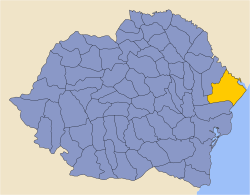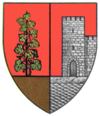Cetatea-Albă County
| Județul Cetatea-Albă | ||
|---|---|---|
| County (Județ) | ||
|
||
 |
||
| Country |
|
|
| Historic region | Bessarabia | |
| Capital city (Reședință de județ) | Cetatea-Albă | |
| Established | 1925 | |
| Ceased to exist | Administrative and Constitutional Reform in 1938 | |
| Government | ||
| • Type | Prefect | |
| Area | ||
| • Land | 7,595 km2 (2,932 sq mi) | |
| Population | ||
| • Total | 340,459 (1,930 Census) | |
| Time zone | EET (UTC+2) | |
| • Summer (DST) | EEST (UTC+3) | |
Cetatea-Albă was a county (județ) of Romania, in Bessarabia, with the capital city at Cetatea-Albă.
The county neighboured Odessa Oblast of USSR to the east, the Black Sea to the south-east, the counties of Tighina to the north, Ismail to the south and Cahul to the west.
The county consisted of six districts (plăṣi) : Cazaci, Tarutina, Taslâc (with the seat at Arciz), Tatar-Bunar, Tuzla (with the seat at Cetatea-Albă) and Volințiri. Between 1918 and 1930 it comprised eight districts:
The Coat of Arms featured a tree on the sinister and the fortress of Cetatea-Albă on the dexter.
According to the Romanian census of 1930 the population of Cetatea Albă County was 340,459, of which 20.9% were ethnic Bulgarians, 20.5% ethnic Ukrainians, 18.5% Romanians, 17.3% Russians 16.3% ethnic Germans, 3.3% Jews, 3.3% Gagauz and 0.1% Armenians. Classified by religion: 79.0% were Orthodox Christian, 16.3% Lutheran, 4.7% Jews.
After the 1938 Administrative and Constitutional Reform, this county merged with the counties of Lăpușna, Orhei and Tighina to form Ținutul Nistru.
...
Wikipedia

